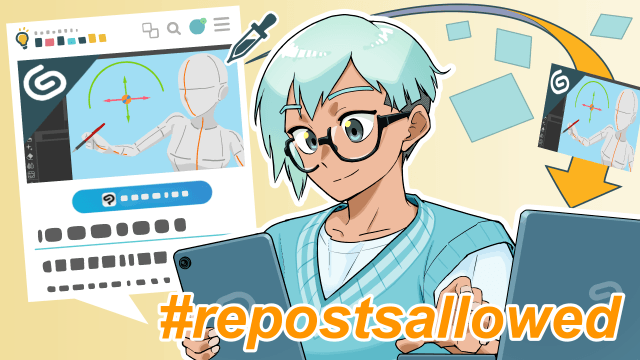Process for a digital illustration
Hello everyone, my name is Manu and I'll be showing you my process for this illustration of a commission i did some time ago.
For this particular commission, the client gave me references for the character and pose they wanted, so the first step was the sketch. First i used a 3d model to mimic the reference i was given.
Then after posing the model, I'll lower the opacity and then trace over to more or less "get" how the general pose would work, I prefer to first draw my characters "naked" because it helps to visualice how the clothes would fold and act with the body; it helps to make the clothes more natural.
While obviously having a 3D model like this helps a lot, it can look "weird" in some part so I always redo the sketch, this time using other references (tutorials, real photos, more realistic 3d models) so i can get the character to look better. In this case when i redid the sketch i used lots of reference for the left hand and the head.
Another important thing to keep in mind is to "flip" your canvas to make sure the drawing is balanced and not unintentional "wonky"; you can do this every once in awhile in the process, but I prefer to have another window all the time with one of the drawings set to the oposite direction. For this you can go to Window > Canvas > New Window, that will create another window of the same drawing, then you can Flip the canvas horizontally (in my case I do this by pressing Ctrl+H). It would look like this:
Here's the sketch finished and ready for the next step: Lineart!
For the lineart step I prefer to work with vector layers. Vector layers are great for many reasons: you can narrow or thicken the line with a more precision; you can also edit individuals point of the line to fit your sketch more instead of having to redo the whole line; and when resized or transformed vector layers don't get blurry.
After finishing the lineart then I'll start with the flat coloring. Using again the references given by the client I'll color the character dividing each part (the skin, the hair, the gloves, suit, hat, etc.) in different layers so it's easier for me to paint in the later steps. Here's the result:
Now I'll start with the painting step. For this I decided for a background color, a nice purple; the reason for this is because since the main suit of the character is made of latex and latex is a very reflective material, it helps with the painting of the character clothes and it feels more integrated with the background.
Another important thing on this step is always look for references, whenever is things I painted thousand of times (faces, skin) to things I don't have that much of a experience (latex, fire, etc.). Another thing that was important was the lighting: since the character is doing a fire spell I decided to use that as the main light source and work the rest based on that.
One tip when it comes to painting skin is to start with a mid tone instead of the light tone showed in the last image, this helps to work the highlights better and more naturally.
After I finished painting the rest of the character I'll use an add glow layer to add, well, some glow to the character.
And then after some small details, like the highlight in the eyes, some glow in the fire and a small shadow in the character feet, it is done! Here's again the final result:























Comment